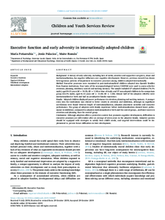Abstract
Background
A history of early adversity, including lack of stable, sensitive and supportive caregivers, abuse and institutionalization, has negative influences over cognitive development. However, previous research has shown heterogeneous patterns of impairment in executive processes among children adopted internationally.
Method
Executive functions were examined in post-institutionalized children adopted into Spanish families from Russian institutions. Four tasks of the neuropsychological battery CANTAB were used to assess selective attention, planning, inhibitory control and working memory. The sample included 27 adopted children (74.1% male), aged 8-13 years (M = 10.35; SD = 1.34) at time of study, and 37 non-adopted children in the comparison group (54.1% male), aged 8-13 years (M = 11.00; SD = 1.40). Almost half of the adoptees (48.6%) were institutionalized at birth and had no preadoptive family experience.
Results
Adopted children displayed poorer performance in attention, planning and working memory. A younger entry into the institutions was related to better results in attention and inhibition, although no significant correlations were found between length of institutionalization, adoption placement variables and executive performance. The group of adoptees with family experience before institutionalization showed lower performance in inhibition –compared to adoptees institutionalized at birth and the control group–, and lower scores in attention and planning than the control group.
Conclusions
Although adoption offers a protective context that promotes cognitive development, difficulties in executive processes are still evident after an average of seven years in the adoptive family. Adoptive parents should be equipped with strategies to satisfy their child’s needs, and targeted interventions could be implemented to prevent future difficulties in their development.
View article here.

